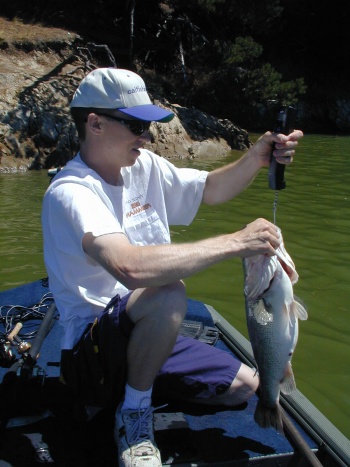|
There’s been a lot of talk about scales online over the years. People love to debate scale accuracy and certifiability. I’m going to run down some of the more popular scale models here to help you make a decision about what you want to do for a scale. Since there are dozens of scales on the market, I don’t have comments on all of them, but the general concepts are going to be the same regardless what brand you own.
There are quite a few sub $40 scales on the market. Some of the more popular include the Berkeley 50lb, 20lb and the new 30lb model, the Stren 50lb scale, and the Rapala 15 and 50lb scales. Right off the top I would rule out the Rapala 15lb scale and the Berkeley 20lb scale because let’s face it, the world record is 22lbs 4oz and if you caught one over 20lbs, you’d really want to know how much it weighed. Among the 30lbs+ scale models available, they all have the same general features. They’re relatively small, easy to transport, and can be fairly accurate. I say fairly accurate because my experience with these scales has been that they just don’t always weigh accurately or consistently. The typical thing you find with these scales is that either you get a perfect one that weighs consistently every time, you get one that weighs consistently light or heavy, or you get one that weighs inconsistently. The only way to find out is to test the scale yourself. fairly accurate because my experience with these scales has been that they just don’t always weigh accurately or consistently. The typical thing you find with these scales is that either you get a perfect one that weighs consistently every time, you get one that weighs consistently light or heavy, or you get one that weighs inconsistently. The only way to find out is to test the scale yourself.
To test a scale, the sure fire method is to go to the grocery store and weigh a variety of objects on the calibrated produce scales, then take them home and weigh them on your scale. For example, get a bottle of Gatorade, and two 1 gallon water bottles (water typically weighs 8lbs 8oz per gallon). You can weigh them individually or put them in a plastic grocery bag and weigh them in combination to test your scale at a variety of weights. Remember to zero out your scale (typically by holding the power button down) between each weighing, and re-weigh at each weight 3 or 4 times to ensure consistency. If you have a brand new scale and it is inaccurate or inconsistent, consider taking it back where you bought it and returning it for a replacement. Even with these less expensive scales, if you take the time to check your scale, you should be able to get one that weighs consistently and accurately. Once you get one that works well, they tend to work well forever, just make sure to get a good one from the start.
There are several high dollar scales worth discussing here for use as a handheld. They include the Salter Digital scale (55 and 100lb models), the Boga Grip (15, 30 and 60lb models) and the Stren Cul-M-Rite scale. Off the top, I would not consider the Cul-M-Rite as a scale for use weighing trophy bass because it only weighs up to 15lbs, and the same for the Boga Grip 15lb model. I know more than one person who has tried to weigh a 15+ on a Cul-M-Rite only to find out that the scale didn’t go past 15. Tournament guys should pay attention here!
The Salter scale and the Boga grip are both highly accurate scales and deserve consideration by the serious trophy hunter. The main difference between the two is that the Salter scale is digital and the Boga is spring loaded. Because the Boga is spring loaded, it weighs in much larger increments than the Salter. If you don’t mind the relative inaccuracy, the Boga could be a great option. They are highly accurate, consistent and very simple to use with the handy dandy lip gripping feature. If you want to know within 5/100ths of a pound what your bass weighs, the Salter is going to be your better bet. This is the scale that I use personally. The Salter can weigh in pounds and ounces to the 1/2oz, pounds and decimal to 5/100ths, and in KG. I have also recently been told that more recent models of the Salter scale weigh to 1/100th.
Scale certification is worth discussing at this juncture. There are two basic options when it comes to getting your scale certified. One is to get it certified by your local department of weights and measures (look them up in the phone book or online) and the other is to get it certified by the IGFA. Both are equally valid methods. For the sub $40 scales discussed, the odds that either organization will certify you scale are probably about 50/50. It comes down to accuracy and consistency. For the $40 and up scales discussed, the odds are very good that your scale will be certified. If you are really truly after the record, getting your scale certified by the IGFA directly is probably a good bet, just from the standpoint that they are also the people would be approving (or potentially denying) your record fish.
|
